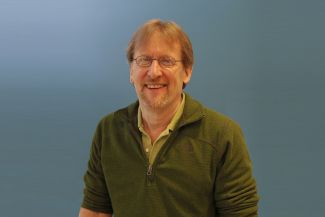
My primary passion within the field of occupational therapy is working with OT practitioners and students to provide philosophically-oriented, occupation-based, and client-centered services across all settings throughout the evaluation, intervention and outcome evaluation process. I firmly believe a solid foundation in the art of occupational therapy is critical to implement a science-driven profession. As such, my primary work with students revolves around developing their skills to interact therapeutically with clients and use authentic, meaningful occupation to promote client health and well-being.
My fundamental enthusiasm as an educator is the promotion of a student-centered environment and experience throughout the three year program. I believe the life experiences that students bring are an important component of OT education and each student’s worldview should be sought and valued. I strive to foster a climate of inclusion within which students can master the skills of OT practice and pursue their unique passions and interests.
The international practice of occupational therapy is a particular interest of mine. As a faculty advisor, I have collaborated with students to implement their capstone projects in Bangladesh, Scotland, and South Africa. Since 1998, I have led continuing professional development courses in the United Kingdom and Ireland for practitioners across all settings.
Education
2013, PhD, Occupational Therapy, University of Sydney, Australia
1993, MS, Occupational Therapy, University of Illinois at Chicago, USA
1984, BS, Occupational Therapy, University of Puget Sound, Washington, USA
Presentations
Enacting Client-Centred Interdisciplinary Rehabilitation (poster)
May 21-25, 2018, 17th Int. Congress World Federation of OT, Cape Town, South Africa
Goal Setting in Occupational Therapy: Evaluating Client-Centred Outcomes (workshop)
Mar 13-16, Harrison Training, Dublin, Ireland
Documentation from an OT Perspective (workshop)
Mar 7-8, Harrison Training, Cambridge, United Kingdom
Five Key Issues to Consider When Using Standardized Assessments in Practice
Oct 7-8, 2016, Annual Conference, OT Association of Oregon, Portland, OR, USA
The QU.E.S.T. - Field-Testing a Self-Report Assessment
Jun 15-19, 2016, 1st COTEC-ENOTHE Congress, Galway, Ireland
The QU.E.S.T. - Developing Content for a Self-Report Assessment
Jun 15-19, 2016, 1st COTEC-ENOTHE Congress, Galway, Ireland
Ensuring Quality Training - More Than the Content
Jun 10, 2016, Harrison Training, Bradford-on-Avon, United Kingdom
Evaluating Client-Centered Outcomes in Case Management
Jun 8, 2016, Harrison Associates, London, United Kingdom
Occupation-Based Therapy
May 29, 2016, Workshop, Center for Rehabilitation of the Paralyzed (CRP), Savar, Bangladesh
Evaluating Outcomes of Occupational Therapy
Oct 5, 2015, Workshop, Center for Rehabilitation of the Paralyzed (CRP), Savar, Bangladesh
The QU.E.S.T. - Field-Testing a Self-Report Assessment
Sep 14-17, 2015, 6th Asia Pacific Occupational Therapy Congress, Rotorua, New Zealand
The QU.E.S.T. - Developing Content for a Self-Report Assessment
Sep 14-17, 2015, 6th Asia Pacific Occupational Therapy Congress, Rotorua, New Zealand
Five Key Issues to Consider When Using Standardized Assessments in Practice
Oct 17, 2014, Annual Conference, OT Association of Oregon, Lake Oswego, OR, USA
The QU.E.S.T. - Field-Testing a Self-Report Assessment (poster)
Jun 18-21, 2014, 16th Int. Congress World Federation of OT, Yokohama, Japan
The QU.E.S.T. - Developing Content for a Self-Report Assessment
Jun 18-21, 2014, 16th Int. Congress World Federation of OT, Yokohama, Japan
Using the Canadian Occupational Performance Measure (COPM) in Practice
Oct 19, 2013, Annual Conference, OT Association of Oregon, Lake Oswego, OR, USA
Publications
Park, S., & Byers-Connon, S. (2013). Promoting engagement in leisure and social participation. In M. B. Early (Ed.), Physical dysfunction practice skills for the occupational therapy assistant (3rd ed., pp. 354-369). St. Louis: Mosby Elsevier.
Park, S. (2012). Setting goals that express the possibilities: If we don't know where we're going, how will we know when we get there? In S. J. Lane & A. C. Bundy (Eds.), Kids can be kids: Promoting the occupations and activities of children (pp. 349-367). Philadelphia: FA Davis.
Park, S., & Byers-Connon, S. (2012). Opportunities for best practice in various settings. In R. L. Padilla, S. Byers-Connon & H. L. Lohman (Eds.), Occupational therapy with elders: Strategies for the COTA (3rd ed., pp. 103-120). St. Louis: Mosby Elsevier.
Park, S. (2011). Setting and evaluating person-centred goals: An outcome of occupation analysis. In L. Mackenzie & G. O’Toole (Eds.), Occupation analysis in practice (pp. 312-328). Oxford, UK: Wiley-Blackwell.
Park, S. (2009). Goal setting in occupational therapy: A client-centred perspective. In E. A. B. Duncan (Ed.), Skills for practice in occupational therapy (4th ed., pp. 105-122). Edinburgh, UK: Churchill Livingstone/Elsevier.